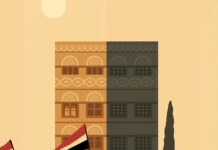Around the middle of July, the commander of Iran’s Quds Force, Esmail Qaani, made a brief yet intensive visit to Baghdad, during which he met with several officials and leaders of armed groups affiliated with Tehran.
This visit followed a period of confused communication between the leaders of Iraqi militias linked to Iran and the Quds Force, the entity responsible for the regional activities of the Revolutionary Guards.
Iraqi Shiite militias that form the backbone of the Popular Mobilisation Forces, legally subordinate to the federal government in Baghdad, are in practice loyal to Tehran and its regional axis.
Yet such loyalty has been under threat since the Iran-Israel war.
Iran and its Proxies in Iraq: Weak Communications
During the war, coordination that was previously led outside of official diplomatic channels became weaker. There was a fear of traced communications and chaos in it’s ranks, linking the Quds Force and its regional network.
A prominent member of Hezbollah, Mohammed Kawtharani, a figure on both the U.S. terrorist and sanctions lists, was a cornerstone of communication.
Since the assassination of Quds Force Commander General Qassem Soleimani, Kawtharani has been the primary official responsible for coordination between the leadership of the Iranian axis and the militias, yet his role significantly declined after the assassination of the party's leader in an Israeli airstrike in the southern suburbs of Beirut in September of last year.
Kata’ib Sayyid al-Shuhada‘s leader, Abu Ala al-Walai, is also a key Iraqi coordinating authority within the Iranian axis.
However, the militia’s cross-border movements have become increasingly challenged in recent times, particularly following the killing of its security chief, Haider al-Musawi, alongside Hussein Khalil, the former bodyguard of the Lebanese Hezbollah leader, in an Israeli airstrike near the Iraq-Iran border.

Qaani Moves to the Rhythm of Drones
It appears that Qaani, one of the most senior military figures to have survived Israeli attacks, is attempting to reconnect with his Iraqi allies and followers. What is the underlying reason for this?
Media reports indicate that Soleimani’s successor has issued a warning regarding Israel’s intentions to target security and militia sites in Iraq. However, private sources suggest that the visit also had other objectives.
For one thing, the visit comes just days after oil sites in Iraqi Kurdistan were targeted by drones of unknown origin. Fingers pointed to groups loyal to Tehran.
The government announced that the drones used were manufactured outside Iraq and appeared to be from a single, unidentified source.
Nevertheless, groups within the Iranian axis accuse a third party, likely Israel, of encouraging Washington to take military action in Iraq.
Iran and the Calm of Iraq
At any rate, there seems to be an Iranian effort to contain the situation to prevent it from escalating into a confrontation between militias and Washington. It is part of the latest Iranian policy to calm the situation in Iraq.
This policy was initiated when an armed group, likely the Iraqi Hezbollah Brigades, targeted a military base in Jordan in January 2024.
At that time, it became evident that Qaani himself was working to rein in the Iraqi armed factions during a visit to Baghdad, and it was reported that one of the groups was dissatisfied with the calls for calm.
Since the outbreak of war between Israel and Hamas, following the latter’s killing and kidnapping of hundreds of Israelis on 7 October 2023, the Iranian regime has been striving to avoid any direct confrontation with the United States and Israel.
Although this effort ultimately failed due to Israeli Prime Minister Benjamin Netanyahu’s insistence on dismantling any real or potential Iranian threat, whether direct or through its proxies, it is evident that Iraq remains so far the only arena where the situation has been relatively well contained.
Contrary to numerous predictions that the Iranian regime is utilising Iraq to heighten tensions, the Iranians have gradually begun to adjust their policies in Iraq over the past two to three years.

Fear of Losing Iraq Permanently
Geopolitically, Iran has lost influence in three key areas: Syria, following the fall of its ally Assad; Lebanon, due to the elimination of Hezbollah’s leadership and the destruction of its military infrastructure; and Gaza under the control of Hamas.
The Houthi-controlled regions of Yemen are experiencing a significant decline in their military and political capabilities compared to their status prior to the Houthis' attacks on ships in the Red Sea.
Thus, Iraq remains the only country that has managed to maintain its position thus far. The Iranians recognise that the existing political structure in Iraq could undergo radical changes if it were to engage in a conflict with Israel or the United States.
Although the current situation in Iraq is not ideal for Tehran, as Baghdad occasionally acts independently of the axis, it is preferable to losing this ally altogether. This nearly happened following the widespread protests in October 2019, which demanded that Iraq be free from Iranian influence and targeted Iranian interests within the country.
Iran’s Iraqi Allies and Friends have Interests Far Away
In addition to the broad social segments of the Shia community, there are influential Shia political parties who are against alignment with the Iranian axis.
A prominent example is Muqtada al-Sadr, who openly opposes the militias loyal to the Revolutionary Guards, and who has publicly urged against being drawn into a military alliance with Iran in the recent conflict. Even allies, such as the groups affiliated with Nouri al-Maliki and Ammar al-Hakim, can alter their stance if their interests necessitate it.
Some militias affiliated with the Iranian axis are also not seeking to engage in open confrontations with Israel, let alone the United States. Their interest in maintaining a stable environment outweigh their desire for conflict.
For instance, Asa'ib Ahl al-Haq, a political group with one of the largest militias that previously fought against American forces and terrorised Iraqis, has become part of the ruling authority and possesses significant financial and political interests that it is unlikely to abandon for a futile confrontation.
Shibl al-Zaydi, founder of Kata’ib al-Imam Ali, is another example of those who have not given up their interests to defend Iran.
Al-Zaydi is a key figure in the Iranian axis as a financial coordinator between the Revolutionary Guards and Shiite armed factions. He is on the U.S. sanctions list and has leveraged his position within the Popular Mobilisation Forces to build wealth and a network of transnational financial relationships.
Despite this, al-Zaydi called on his allies to "adhere to the state's rhetoric," referring to the Iraqi authorities' demand not to be dragged into the war. "Iran in this situation does not need anyone," al-Zaydi justified his call.
The Central Government: Away from the Chaos of War
Despite the central authority itself promoting a anti-Israel rhetoric, Baghdad’s inaction during the 12-day war suggests otherwise.
During the Iran-Israel war crisis and the subsequent U.S. bombing of nuclear sites in central Iran, it was noteworthy that Iraq sought to avoid being drawn, either officially or through semi-official militias, into any escalation of hostilities against U.S. forces or Israel. This raises the question of why pro-Iranian militias did not engage in the confrontation.
Iraqi Prime Minister Mohammed Shia al-Sudani answers this question implicitly, when he has consistently asserted that Baghdad’s policy is to avoid direct involvement in the conflict.
“Iraq has remained stable, unlike in the past when the region was stable and Iraq was turbulent,” Al-Sudani stated in a recent interview with the London-based Saudi newspaper Al-Sharq Al-Awsat.
“We have successfully managed to contain reactions and channel them into balanced political positions through our political and security efforts,” he added, referring to the containment of pro-Iranian militias.
Counting on Washington: White House in Tactical Retreat
Al-Sudani also emphasised that the United States played a significant role in this context, as it "was keen to keep Iraq out of the conflict."
Of course, it is difficult to expect Washington to allow any ally to carry out unilateral military missions in Iraq.
In recent years, the United States has either operated alone or allowed others to carry out missions under its command. Washington has, more than once, launched painful attacks on Iranian-backed militia sites.
It is unclear whether this will continue under President Trump, but the experience of recent years suggests that Washington is unlikely to change this approach.
Pressure of the Abraham Accords
Despite scenes of destruction and death in the Gaza war, the regional climate, particularly in the Gulf, creates a framework of pressure that influences Iraqi politics.
On the one hand, Baghdad officially opposed any normalisation with Israel. In 2022, its parliament passed a law criminalising such actions.
However, over the past few years, Iraq has cultivated good relations with Gulf states, including those hostile to Iran, such as Saudi Arabia, as well as those friendly towards Iran, such as Qatar.
Iraq’s mutual openness with the Gulf Cooperation Council states is a political reality that began to develop in the post-Maliki era, characterised by his harsh rhetoric and intense internal and external disputes. Most of his successors established a different approach: one of appeasement and diplomacy in dealings with Arab states. This approach appears to have persisted ever since.
Saudi Arabia’s Influence in Baghdad
Of course, there is a discrepancy between the policies of the Iraqi government and the rhetoric of certain pro-Iranian militias, which are endeavouring to instil a hostile attitude among their supporters towards countries such as Saudi Arabia.
Pro-Iranian militias level accusations of treason against any potential rapprochement with Israel and against Gulf states, claiming that they previously permitted terrorist fatwas that supported al-Qaeda's ideology.
Yet this rhetoric does not seem to influence the political behaviour of the government, which more often than not, swiftly adopts positions that align with those of Riyadh.
Therefore, the Abraham Accords may not compel Iraq to adopt a similar stance yet they will exert serious pressure on Iraq to avoid isolation in a region leaning towards integration despite the scenes in Gaza.
Baghdad is also cognisant that internal partners, such as the Kurdistan Region and certain Sunni tribes, are inclined towards normalisation. Consequently, its domestic front and regional environment are not conducive to any policy that embraces practical hostility towards Israel.
‘Iran in Iraq’ is Not the Same as it was Ten Years Ago
The lack of participation of Iran’s proxies in Iraq in the war stems primarily from the fact that the political conditions in the country are no longer the same as they were ten years ago.
Although Iran has not completely lost Iraq, it is no longer able to seize the initiative there with the same force as when Qassem Soleimani roamed the country, forcing everyone to submit to his authority.
The situation in Iraq indicates that Baghdad will, at least for the foreseeable future, uphold a political discourse that rejects peace with Israel, while refraining from any escalatory actions on the ground against the Israeli state.
However, this will depend on two factors domestic to Israel and Iraq: Israel’s restraint to hold back on any future multi-directional military attacks in Iraq and any significant domestic political shift that could incite militias aligned with Iran to engage in a frenzy of both domestic and external escalation.
Stay Up to Date with the Latest Articles on DET!
ISIS 2.0: New Islamism in Syria and Iraq
Red Sea, Red Lines: America’s Maritime Security Dilemma
End of an Area: Hope and Anxiety for the Kurds






